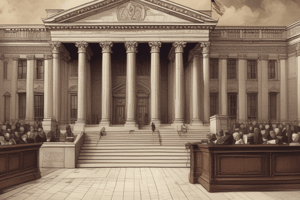Podcast
Questions and Answers
What is the primary purpose of constitutional law?
What is the primary purpose of constitutional law?
- To promote international trade
- To provide social welfare services
- To establish the framework of government and limits of government power (correct)
- To regulate the economy
Which concept is designed to prevent any one branch of government from becoming too powerful?
Which concept is designed to prevent any one branch of government from becoming too powerful?
- Separation of Powers (correct)
- Checks and Balances
- Judicial Review
- Federalism
What is the term for the interpretation of the constitution based on the original intent of the framers?
What is the term for the interpretation of the constitution based on the original intent of the framers?
- Constitutional Crises
- Originalism (correct)
- Living Constitution
- Judicial Activism
What is the right to a fair and impartial trial guaranteed by the US Constitution?
What is the right to a fair and impartial trial guaranteed by the US Constitution?
What is the process of proposing and ratifying changes to the constitution?
What is the process of proposing and ratifying changes to the constitution?
What is the term for the tendency of judges to use their power to shape policy and make law?
What is the term for the tendency of judges to use their power to shape policy and make law?
What is the system of limits and controls on each branch of government to prevent abuse of power?
What is the system of limits and controls on each branch of government to prevent abuse of power?
What is the term for situations in which the constitution is challenged or disputed, often requiring judicial intervention?
What is the term for situations in which the constitution is challenged or disputed, often requiring judicial intervention?
Flashcards are hidden until you start studying
Study Notes
Constitutional Law
Definition and Purpose
- Constitutional law is the body of law that deals with the interpretation and application of a country's constitution
- It sets out the framework of the government, the relationship between the government and the citizens, and the limits of government power
Key Concepts
- Separation of Powers: The division of power among the legislative, executive, and judicial branches of government to prevent any one branch from becoming too powerful
- Checks and Balances: The system of limits and controls on each branch of government to prevent abuse of power
- Federalism: The division of power between the federal government and the states
Constitutional Interpretation
- Originalism: The interpretation of the constitution based on the original intent of the framers
- Living Constitution: The interpretation of the constitution as a dynamic and evolving document that adapts to changing circumstances
- Judicial Review: The power of the judiciary to review and declare laws unconstitutional
Constitutional Rights
- Bill of Rights: The first 10 amendments to the US Constitution, which guarantee individual rights and freedoms
- Due Process: The right to a fair and impartial trial
- Equal Protection: The right to equal treatment under the law
Constitutional Amendments
- Amendment Process: The process of proposing and ratifying changes to the constitution
- Types of Amendments: Amendments can be categorized as procedural, substantive, or rights-based
Constitutional Law and Politics
- Judicial Activism: The tendency of judges to use their power to shape policy and make law
- Constitutional Crises: Situations in which the constitution is challenged or disputed, often requiring judicial intervention
Constitutional Law
Definition and Purpose
- Deals with the interpretation and application of a country's constitution
- Establishes the framework of the government, relationships between government and citizens, and limits of government power
Key Concepts
Separation of Powers
- Division of power among legislative, executive, and judicial branches to prevent abuse of power
- Prevents any one branch from becoming too powerful
Checks and Balances
- System of limits and controls on each branch to prevent abuse of power
- Ensures balance of power among branches
Federalism
- Division of power between federal government and states
- Allocates power and authority between central and regional governments
Constitutional Interpretation
Originalism
- Interpretation of the constitution based on original intent of framers
- Focuses on the historical context and original meaning of the constitution
Living Constitution
- Interpretation of the constitution as a dynamic and evolving document
- Adapts to changing circumstances and societal needs
Judicial Review
- Power of the judiciary to review and declare laws unconstitutional
- Ensures laws align with the constitution and protects individual rights
Constitutional Rights
Bill of Rights
- First 10 amendments to the US Constitution
- Guarantees individual rights and freedoms, such as freedom of speech and religion
Due Process
- Right to a fair and impartial trial
- Ensures individuals are treated fairly and without bias
Equal Protection
- Right to equal treatment under the law
- Prohibits discrimination and ensures equal opportunities
Constitutional Amendments
Amendment Process
- Process of proposing and ratifying changes to the constitution
- Involves both legislative and popular approval
Types of Amendments
- Procedural amendments: change the process of government
- Substantive amendments: change the substance of government power or individual rights
- Rights-based amendments: establish or protect individual rights
Constitutional Law and Politics
Judicial Activism
- Tendency of judges to use their power to shape policy and make law
- Can lead to controversy and debates over the role of the judiciary
Constitutional Crises
- Situations in which the constitution is challenged or disputed
- Often require judicial intervention to resolve the crisis
Studying That Suits You
Use AI to generate personalized quizzes and flashcards to suit your learning preferences.



